'The Indian government wakes up after the fact when it can do nothing, or rather lacks the will, to prosecute military actions to reverse these adverse PLA-driven developments.'
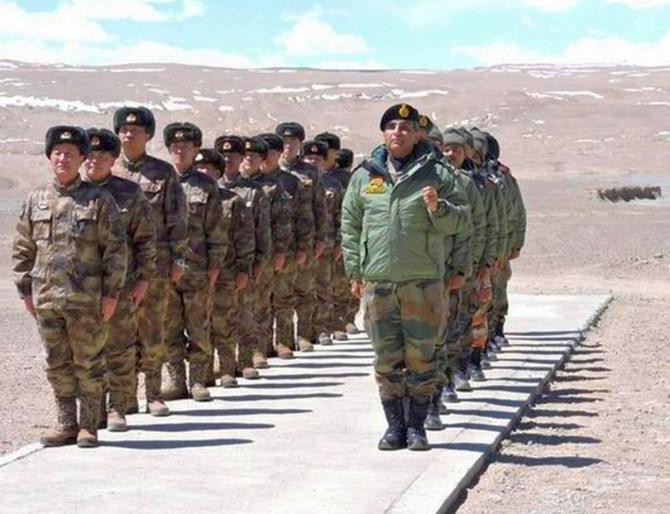
National security expert Dr Bharat Karnad, emeritus professor of national security studies at the Centre for Policy Research, the New Delhi think-tank, is extremely disappointed at the manner in which the disengagement talks are being conducted between India and China.
Professor Karnad does not mince words in expressing his unhappiness at how a true perspective on developments following the Chinese incursion and occupation of Indian territory in eastern Ladakh is not being disseminated to the Indian public.
"These military-to-military talks are a waste of time -- have always been -- and merely afford China an excuse to do nothing at the political level --Special Representatives level -- which is where a solution will be hammered out," Dr Karnad tells Rediff.com Senior Contributor Rashme Sehgal in an exclusive interview.
- Earlier Interviews: 'Limited war is the only option with China'
- 'Indian Army's advantage has been lost'
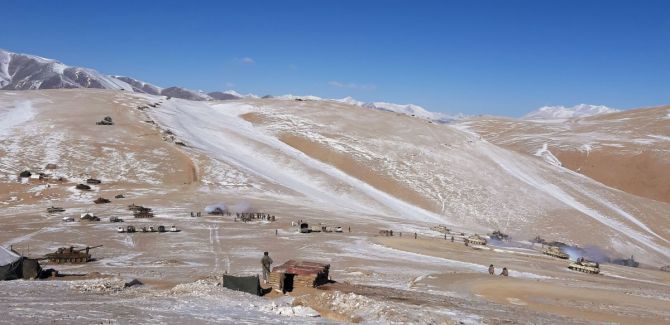
There seems to be no breakthrough in the marathon 13-hour military talks that took place between the Indian and Chinese corps commanders last week. They did not even issue a joint statement this time around. Why was that the case?
The 11th edition of the talks between the Indian and Chinese theatre commanders ended as most of the earlier ones had done -- without any progress at all.
This was so, perhaps, because the two sides were asserting, in different ways, their respective positions that neither party was prepared to back down from. It minimises the prospect of a negotiated remedy.
The PLA has not agreed to troop pullback from the contentious areas which include PPS 15,17 and 17A in the Hot Springs-Gogra-Kongka La areas where they have a sizeable troop presence in the rear areas. Nor are they willing to de-escalate in the Depsang area. What does this indicate?
It shows clearly the PLA's intention to not withdraw from advantageous positions it is holding on to in terms of the Indian patrolling posts you mention and at the Y-Junction on the Depsang Plains while, at the same time, getting the Indian Army to back down from terrain features benefiting it.
The question repeatedly being asked is why the gains accrued by occupying the Kailash range and Trishul Heights were frittered away for disengagement to take place in the north bank of the Pangong Tso lake and not for concessions in the Depsang Plains?
This is the point I have been making from the time the Indian SFF (Special Frontier Force) first occupied the Kailash range heights in September 2020 that the one thing the Indian Army should not do is surrender these high points for any reason, but rather that the SFF and other units should strengthen and consolidate their hold of these favourable terrain features.
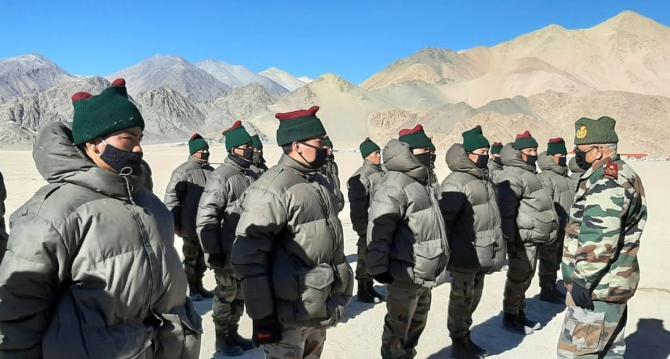
From all indications, it appears as though India is inclined to agree to the Chinese terms in Hot Springs and the Depsang Plains or so one would surmise by the interviews given to the media by the Northern Army commander where it seemed as though he were attempting to disassociate himself from this problem claiming the problem in the Depsang Plains predates April 2020 and therefore will is not part of the current round of negotiations.
So, are we willing to concede around 18 kilometres of territory occupied by the PLA?
This is a ridiculous stance of the Northern Army commander, Lieutenant General Yogesh Kumar Joshi, to talk of disavowing whatever happened before he assumed his post and, even more astonishing, that he says he is responsible ONLY for what has occurred in the field AFTER he took over.
The army commander, in other words, is willing to take 'credit' for the linked withdrawal of the SFF-Indian Army troops from the Kailash range heights and the PLA from Fingers 4 to 8 on the northern shore of the Pangong Lake which has hurt the army's relative military positioning vis a vis the PLA in that sub-area, but is quite content to have the Chinese stay put on the Gogra-Hot Springs and at the Y-Junction on the Depsang.
And that, owing to his acceptance of the latter situation, he and his Command have signalled that they will NOT do anything to recover the nearly 1,000 sq km of Indian territory thus lost, de facto, to the PLA.
This sort of reticence should earn General Joshi, at a minimum, removal from service, unless these are the express orders from the army chief General M M Naravane who in turn, reflects the directive from the Government of India to avoid a re-triggering of hostilities at all cost.
Of course, the government's stand is that what was of priority for them was to ensure that the eye to eyeball troop confrontation between the two armies on the banks of the Pangong Tso lake be halted as this could lead to an escalation.
With China being the aggressor, why should the Indian government/army have been so afraid of a confrontation?
This does not make sense. Why would the Indian Army be afraid of eye-balling the PLA on the Pangong and elsewhere in eastern Ladakh?
After all, it is precisely an aggressive posture telegraphing that the Indian Army is quite prepared to give as good as it gets that will give PLA commanders and Beijing pause for thought.
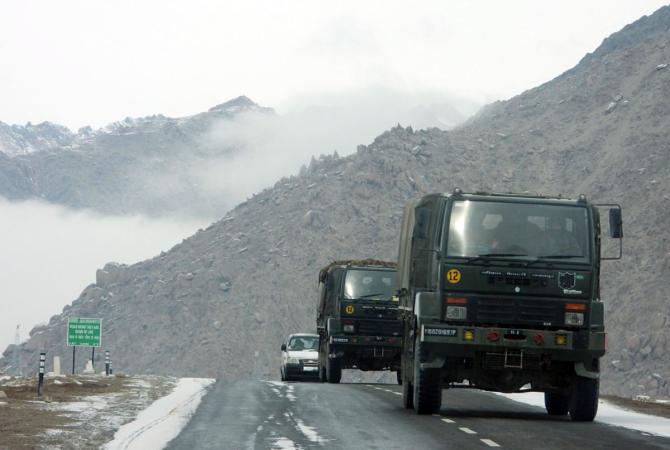
Several defence analysts point out that it is obvious that the Chinese were not willing to disengage further because India has no leverage space with them and therefore it is unlikely they will reduce their troop concentration in eastern Ladakh.
If that is the case, what will the consequences of this be for India?
India has no space to leverage PLA withdrawal because the Indian government and army have been remiss all these years in not proactively strengthening the vulnerable Indian posts or building up supporting infrastructure in selectively prioritised areas, such as Sub-Sector North, adjoining the strategically Karakoram Highway critical to both China and Pakistan because this highway -- GS 219 has a branch -- the China-Pakistan Economic Corridor, diverting south at the Karakoram Pass.
Are these commander level talks trying to arrive at some settlement around the April 2020 incursion without addressing the entire border problem.
Why did the government agree to the sector by sector negotiations in Ladakh rather than negotiate it as a whole?
By agreeing to do so, India has fallen into a trap laid by the Chinese. Why were negotiations not conducted across the entire area?
These military-to-military talks are a waste of time -- have always been -- and merely afford China an excuse to do nothing at the political level -- Special Representatives level -- which is where a solution will be hammered out.

While the government has gone overboard on stating that there have been no Chinese incursions in Indian territory, US Admiral Philip Davidson has stated that the PLA has not withdrawn from several 'forward positions' which they have occupied. This statement was not contradicted by the Indian government.
All the US Indo-Pacific Commander Admiral Davidson has done is repeat what I and a few others have been saying since the PLA armed incursions came to light in June last year.
Nothing big there, unless it is to point out that the Indian government and media take something coming out of America more seriously than they do about what is being openly said by well-informed analysts here.
 Dr Bharat Karnad.
Dr Bharat Karnad.Does Admiral Davidson's statement contradict not contradict Defence Minister Rajnath Singh's statement in Parliament that we have made no concessions to the Chinese?
Of course, it does, if you lend Davidson's words weight.
India seems to have foregone their grazing rights in the Demchuk area with this land being occupied by Chinese Tibetan graziers.
Ladakhis continue to complain against this, but the government has failed to take any action on the ground.
The record of Ladakhi graziers taking their herds to the Depsang Plains is strong evidence for India's negotiating position, which is trumped by the PLA simply establishing their presence -- something the local administration, Indian government and army should have done proactively a long time ago.
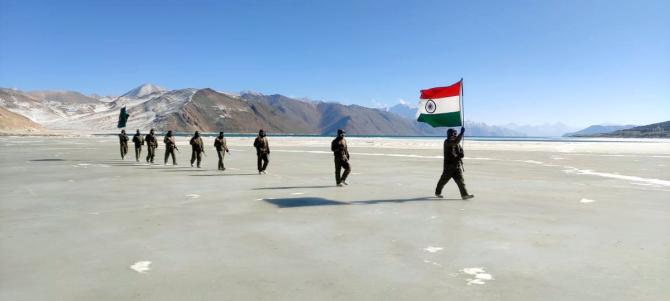
Why has the issue of the massive failure intelligence failure highlighted the PLA build up not been acted upon?
The Indian government wakes up after the fact when it can do nothing, or rather lacks the will to prosecute military actions to reverse these adverse PLA-driven developments.
Which ought to make everybody wonder what good if anything, our numerous civilian and military intelligence agencies do.
The fact that the government is willing to make concessions means they understand that this is not going to impact the mood in the Indian Army.
India seems to have a history of making concessions, whether it be in Tashkent in 1966 or in Simla in 1972.
Which country cedes so much territory with no assurances on the ground?
The Indian Army brass is very much in sync with the GoI's thinking and happy for the government to make concessions to China just so long as they do not have to actually fight the PLA.
Would it be correct to say the 35-year old treaty of the maintenance of peace and tranquillity along the LAC has been consigned to the dustbin of history?
China wanted to teach the Indian political class a lesson for making claims that Aksai Chin and PoK were all part of India and in response to their redrawing of Indian maps making such claims.
The peace and tranquillity accord signed was a sham from the start because it was a way for the Indian government, intelligence agencies and the military to avoid reorienting fully to the only credible threat India faces, namely, China.
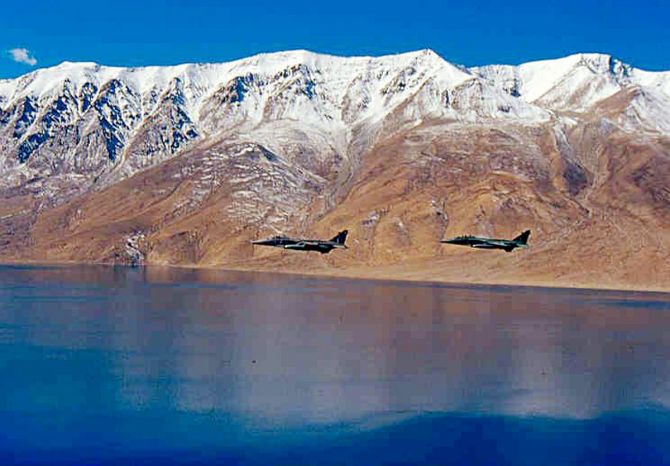
Would it be correct to state that our present leadership is more interested in playing to the domestic class rather than in pursuing policies that suit India's geopolitical needs?
Not sure what you mean by 'domestic political class'.
Surely, no section of Indian society wants a dishonourable peace with China; and geopolitics has perennially been India's overarching strategic weakness.
In 2013, when the Chinese moved into Depsang Plains, India took a diversionary chunk of territory in order to get them to negotiate. Why was no attempt to put pressure on the Chinese this time around?
Two reasons: No political will, with Prime Minister Narendra Modi, conflicted about how much to alienate President Xi and imperil the supposedly good personal relations the two have cultivated as also the possibility of massive Chinese infrastructure investment.
And inadequate military capability with the Pakistan-fixated army reluctant to commit its resources more fully to the extended China front.
It seems to me that there is no hope of returning to the status quo ante of April 2020.
Is it correct that all the new buffer zones that have been created post-April 2020 are now on the Indian side of our patrolling points?
By and large, true.
To come specifically to the Gogra Hot Spring area, do you see any concessions?
The Chinese, unlike the Indians who can't see beyond their noses, act always with the long view in mind.
So, no, the PLA is unlikely to concede on Gogra and Hot Springs, or remove its blockade of the Y-Junction in the Depsang.
Feature Presentation: Rajesh Alva/Rediff.com



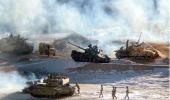






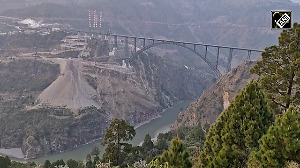
 © 2025
© 2025